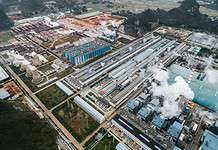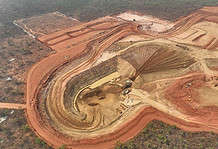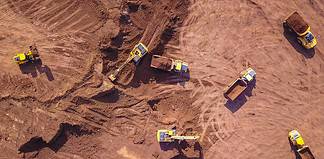By Cameron Drummond
A recently granted environmental protection license at its rare earth project near Dubbo has given Alkane Resources 1 billion reasons to be excited for the future.
Alkane started 2016 with its head held high. The Perth-based company boosted profits for the half year to December 31 by 90 per cent – bolstered by high gold prices and lower production costs – and will use this cash flow to help fund its $1 billion Dubbo Zirconia project (DZP).
The company has two major projects underway in rural NSW; the DZP rare metals and rare earths mine and the nearby Tomingley gold operation (TGO), as well as interests in the surrounding region.
In February this year, Alkane managing director Ian Chalmers said the company aimed to use cashflow from the TGO, which has been in production since 2014, to help get its DZP up and running.
“The TGO is only a medium sized gold mine, but it’s very important to provide good cash flow to Alkane with the objective of getting the much larger, strategic DZP into production,” Mr Chalmers said.
“The TGO being in production serves another important purpose in that when we are talking to potential off-take partners and financiers on the DZP they can see that we are proven operators and not just explorers.”
Bright horizons
On 15 March Alkane was granted its all-important environment protection licence (EPL) for the DZP; the last piece of red tape to cut through before the mining operation can go ahead.
Industry, Resources and Energy minister Anthony Roberts said the massive project would provide enormous benefits locally, to the state and the entire country.
China produces more than 90 per cent of the world’s supply of rare earths and is increasing its output, accounting for between 70 per cent and-80 per cent of the world’s zirconium production.
The DZP will produce zirconium, hafnium, niobium, light rare earths and heavy rare earths which can be used in modern technologies such as computer and mobile phone components, as well as air flight safety equipment.
Alkane aims to be the largest producer of hafnium in the world, a rare earth mineral that is used in jet engine turbines alloys to increase heat resistance.
“The Dubbo zirconia project has significant potential to stimulate not only local industry but also NSW manufacturers, Australian industry and exports across the globe,” Mr Roberts said.
“Customers from around the globe – the US, Japan and a number of European nations – consider the products of this project to be a critical and strategic importance.”
The company is in talks with some of the world’s largest aerospace technology companies for funding opportunities, including Lockheed Martin, Boeing and Honeywell.
Deputy Premier and Member for Dubbo Troy Grant welcomed the enormous investment in the region and the effect it would have on the local economy.
“More than $1 billion will be invested in the project and about $50 million spent in the Dubbo region each year,” he said.
“About 450 people will be employed during construction of the project and more than 250 when it is operating.” This project is very exciting and will not only be a boon for Dubbo, but the state and country as well.”
“The Dubbo zirconia project is a prime example of what discoveries may be made in NSW,”
Letter of intent
On 7 April, Alkane, through its wholly owned subsidiary Australian Zirconia, signed a letter of intent for Vietnam Rare Earth (VTRE) to process materials from the DZP.
VTRE is a chemical and advanced materials company with a rare earth oxide separation plant near Hanoi, Vietnam which was commissioned in 2012.
The DZP can produce up to 6664t of separated rare earth products, but initially only 2000 tonnes per annum of high value rare earths would be shipped to the Vietnamese facility for processing.
These high value rare earths would include the magnet metals of neodymium, praseodymium, didymium, dysprosium and terbium – which would account for about 85 per cent of all DZP rare earths revenue, or 35 per cent of the overall anticipated project revenue.
Lanthanum-cerium and yttrium would be recovered at the DZP, with yttrium oxide sold directly from the site, with the separated lanthanum and cerium to be stored until markets improved.
The partnership guidelines gave Alkane an exclusive right for 12 months to complete due diligence and finalise the terms of the agreement, including an option to purchase equity in VTRE.
Alkane stated that VTRE’s operating costs were similar to, or lower than, its Chinese competitors; ensuring production was market competitive. The partnership was also an opportunity to participate in the downstream integrated rare earths processing to avoid potential market and financial risks.
Financials
Alkane’s revenue of $55.4 million included increased profit for the half-year of $5.12 million. About 35,136oz of gold were produced from TGO at an all-in sustaining cost (AISC) of $1270 per ounce, which yielded a $302/oz profit.
Alkane’s production guidance for the 2016 financial year was between 60,000oz of gold and 70,000oz of gold at an AISC of between $1200 and$1300/oz of gold.
“Over the next three to four years the gold production from the open pits should vary between 60,000 and 70,000 ounces per annum,” Mr Chalmers said.
“At that higher end of production the costs per ounce and free cash flow would be extremely attractive, particularly if the gold price holds around this healthy level of $1600/oz.
“Simply, each $100/oz increase in the price on an average production of 65,000oz adds $6.5 million to the annual cash flow.”
Alkane is continuing to explore finance options for the DZP, courting potential strategic and off-take partners with the assistance of financial advisors Sumitomo Mitsui Banking Corporation.
The company announced plans on 26 April to raise $16 million to further progress the development of the DZP and meet expenses.








































